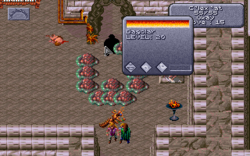RPG Watch double teamed Drakensang
RPG Watch double teamed Drakensang
Review - posted by Monolith on Wed 10 June 2009, 20:15:13
Tags: Drakensang; PeroxideRPG Watch has posted two separate reviews of Drakensang, one written by Gorath (who reviewed the German version), the other one by Corwin. Both are well written and mostly positive, with Corwin's one finishing off presenting Dhruin's and txa1265's opinions on the game.
Gorath:
Quests in Drakensang cover a wide range of topics, from typical “kill xy” or “find z” tasks, which can often be dealt with on the fly, to a few puzzles to really interesting jobs like winning a court case. The most enjoyable ones are the few quest rows with the possibility of choosing your side or playing side A off against side B, A Fistful of Dollars style. Not all quests can be solved on autopilot - sometimes the player has to put on his thinking cap.
The quests are good entertainment, especially in combination with the unique writing style. Even the weaker ones, the main quest for example, are on the better end of average. Unfortunately Drakensang lacks choices between good & evil, and
most quests are strictly linear. In more than one case, creatures in an area I had already cleaned respawned because the quest structure wanted it. To be fair, the linearity has been communicated from day one, and unrelated quests in the same area can be solved in any order.Bad layout brought to you by RPG Watch.
Corwin:
The ability to use tactics, rather than just mashing the left mouse button, was what made the combat reasonably enjoyable - most of the time. By careful positioning, you could send a stream of arrows, knives and/or an area effect spell towards a group of enemies before they got close enough to melee. Then, by changing a character’s aggression, you could send some fighters in to close combat while others stayed behind. Using skill attacks in the right place, perhaps aided by a debuff spell from a caster would further reduce the effectiveness of the enemies often overwhelming numbers.
Combat did tend to become tedious, especially towards the end of the game and most noticeably during a particular ‘kill the rat’ campaign. Buffing spells were normally helpful but decent attack spells often took far too long to cast - a good summons was usually of more benefit. Special attacks and spells could easily be launched from a toolbar and the pause feature allowed you to do anything other than changing armour in the middle of a fight; this facilitated the use of party tactics as you could pause and issue individual queued commands to each party member.
Gorath:
Quests in Drakensang cover a wide range of topics, from typical “kill xy” or “find z” tasks, which can often be dealt with on the fly, to a few puzzles to really interesting jobs like winning a court case. The most enjoyable ones are the few quest rows with the possibility of choosing your side or playing side A off against side B, A Fistful of Dollars style. Not all quests can be solved on autopilot - sometimes the player has to put on his thinking cap.
The quests are good entertainment, especially in combination with the unique writing style. Even the weaker ones, the main quest for example, are on the better end of average. Unfortunately Drakensang lacks choices between good & evil, and
most quests are strictly linear. In more than one case, creatures in an area I had already cleaned respawned because the quest structure wanted it. To be fair, the linearity has been communicated from day one, and unrelated quests in the same area can be solved in any order.
Corwin:
The ability to use tactics, rather than just mashing the left mouse button, was what made the combat reasonably enjoyable - most of the time. By careful positioning, you could send a stream of arrows, knives and/or an area effect spell towards a group of enemies before they got close enough to melee. Then, by changing a character’s aggression, you could send some fighters in to close combat while others stayed behind. Using skill attacks in the right place, perhaps aided by a debuff spell from a caster would further reduce the effectiveness of the enemies often overwhelming numbers.
Combat did tend to become tedious, especially towards the end of the game and most noticeably during a particular ‘kill the rat’ campaign. Buffing spells were normally helpful but decent attack spells often took far too long to cast - a good summons was usually of more benefit. Special attacks and spells could easily be launched from a toolbar and the pause feature allowed you to do anything other than changing armour in the middle of a fight; this facilitated the use of party tactics as you could pause and issue individual queued commands to each party member.














